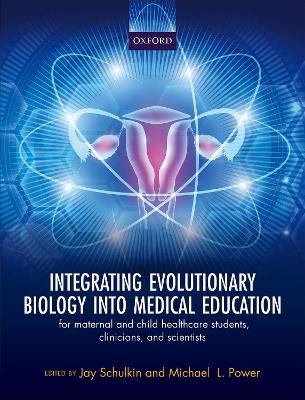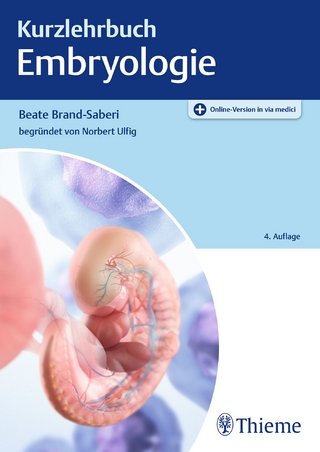
Integrating Evolutionary Biology into Medical Education
Oxford University Press (Verlag)
978-0-19-881415-3 (ISBN)
Clinicians and scientists are increasingly recognising the importance of an evolutionary perspective in studying the aetiology, prevention, and treatment of human disease; the growing prominence of genetics in medicine is further adding to the interest in evolutionary medicine. In spite of this, too few medical students or residents study evolution.
This book builds a compelling case for integrating evolutionary biology into undergraduate and postgraduate medical education, as well as its intrinsic value to medicine. Chapter by chapter, the authors - experts in anthropology, biology, ecology, physiology, public health, and various disciplines of medicine - present the rationale for clinically-relevant evolutionary thinking. They achieve this within the broader context of medicine but through the focused lens of maternal and child health, with an emphasis on female reproduction and the early-life biochemical, immunological, and microbial responses influenced by evolution.
The tightly woven and accessible narrative illustrates how a medical education that considers evolved traits can deepen our understanding of the complexities of the human body, variability in health, susceptibility to disease, and ultimately help guide treatment, prevention, and public health policy. However, integrating evolutionary biology into medical education continues to face several roadblocks. The medical curriculum is already replete with complex subjects and a long period of training. The addition of an evolutionary perspective to this curriculum would certainly seem daunting, and many medical educators express concern over potential controversy if evolution is introduced into the curriculum of their schools. Medical education urgently needs strategies and teaching aids to lower the barriers to incorporating evolution into medical training.
In summary, this call to arms makes a strong case for incorporating evolutionary thinking early in medical training to help guide the types of critical questions physicians ask, or should be asking. It will be of relevance and use to evolutionary biologists, physicians, medical students, and biomedical research scientists.
Dr. Schulkin is a research Professor in the Department of Neuroscience at Georgetown University Medical Center and the Department of Obstetrics and Gynecology at the University of Washington. Dr Michael L Power is an Animal Scientist at the Smithsonian Conservation Biology Institute. Recently, his research has expanded to include investigations of hormones and other bioactive molecules in milk and the milk microbiome. He is the curator of the Milk Repository at the Smithsonian, which contains milk samples from over 200 mammals.
ForewordCharles J. Lockwood:
IntroductionMichael L. Power & Jay Schulkin:
Section I: Life History: Biological and Cultural Continuity
1: Peter D. Gluckman, Felicia M. Low, & Mark A. Hanson: Evolutionary Medicine, Pregnancy, and the Mismatch Pathways to Increased Disease Disk
2: Jonathan C. K. Wells: Evolutionary Public Health
3: Wenda R. Trevathan & Karen R. Rosenberg: Evolutionary Medicine and Women's Reproductive Health
4: Alison M. Stuebe & Kristin P. Tully: Optimizing Maternal Infant Health Care: a focus on the 4th trimester
Section II: Biological Regulation
5: Heide Aungst, Robert Rossi, Heather Brockway, Sam Mesiano, & Louis Muglia: Evolutionary Insights for Improving Pregnancy Outcomes: looking back to the future
6: Robert Perlman: An Evolutionary View of Homeostasis: bioenergetics, life history theory and responses to pregnancy
7: Michael L. Power, Caroline W. Quaglieri, Eda G. Reed, & Jay Schulkin: The Functions of MicroRNA in Female Reproduction
8: Chloe Zera & Louise Wilkins-Haug: Evolutionary Medicine Viewed Through the Lens of Pregnancy and the Obesity Epidemic
Section III: Perspectives: Past, Present, and Future
9: Fabio Zampieri: Darwin's Impact on the Medical Sciences
10: Barbara N. Horowitz: Tinbergean Approach to Clinical Medicine
11: Carsten Schradin & Rainer Straub: The Role of the Immune System From an Evolutionary Perspective
12: Louise Wilkins-Haug: Evolution, Genomics, and the New Genetic Technologies
13: Shabnam Mousavi & Jay Schulkin: Ecological Rationality and Evolutionary Medicine: a bridge to medical education
| Erscheinungsdatum | 26.02.2020 |
|---|---|
| Verlagsort | Oxford |
| Sprache | englisch |
| Maße | 193 x 245 mm |
| Gewicht | 744 g |
| Themenwelt | Medizin / Pharmazie ► Medizinische Fachgebiete |
| Studium ► 1. Studienabschnitt (Vorklinik) ► Histologie / Embryologie | |
| Studium ► Querschnittsbereiche ► Prävention / Gesundheitsförderung | |
| ISBN-10 | 0-19-881415-1 / 0198814151 |
| ISBN-13 | 978-0-19-881415-3 / 9780198814153 |
| Zustand | Neuware |
| Informationen gemäß Produktsicherheitsverordnung (GPSR) | |
| Haben Sie eine Frage zum Produkt? |
aus dem Bereich


